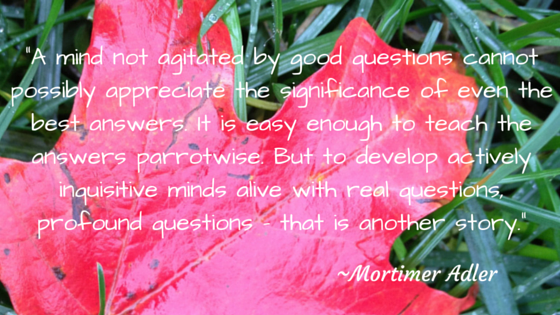
A Matter of Character
In learning to ask good questions we must consider the question a catalyst. By doing that we focus on how it produces an effect and learn how to ask questions appropriately. If I know a good question, but do not ask it in light of the needs of the person I am speaking with or the environment we are in, the question does not do what it should.
The question itself is one of several factors that determine how a person responds when queried. These are some things that can influence whether a question evokes a good response:
- the current attitude of the respondent
- the tone in which the question is asked
- my relationship with the person
- my perceived expectations
- the respondent’s history with being asked questions
It is the mix of these things AND the question that determine whether my questions are constructive and edifying.
To think of question asking as a skill is to reduce it to technique and depersonalize the process. When I ask a person a question, I am dignifying the person with my interest in his or her response. My questions are not about eliciting facts, they are about engaging a person; they are a personal transaction, not a sterile data collection. I must remember that my questions must start deep within me and reflect a genuine care for the other person.
An effective question is more about the asker and his or her character than it is about the question itself. A good question can lose its effect if the asker is lacking the following character traits:
- Humility The primary attribute of a good questioner is a spirit of humility. It is a spirit that assumes the questioner always has more to learn and enters the question asking exchange slow to judge.
- Curiosity The curious questioner is an explorer willing to see where a question takes him without prior expectations. He may discover something he never could have anticipated and takes delight in the process.
- Caring When a person asks a question, the respondent responds to the person more than to the question itself. Even the way a question is constructed or delivered can telegraph care and respect for the other person.
- Observation Questioners are keen observers. They notice people’s nonverbal cues that reveal openness or, maybe, fear. They let the expressions of the person they are speaking with guide the flow of asking.
- Flexibility All questions involve risk. One can never predict how another might interpret and answer a question. The questioner needs to adapt to the comfort level of the responder. She may also need to change her expectations mid conversation as she discovers new things about the other person.
When I view question asking as a character issue, I am prevented from using questions to gain power, to manipulate, or to engage in any kind of verbal abuse. And, when asking questions is a character issue, the condition of my heart is more important than the questions I ask.
– Randy Raysbrook
Randy Raysbrook has been on staff with The Navigators for 35 years where he has trained college students, business professionals, and church leaders in discipleship and leadership development. His responsibilities include a local discipleship ministry as well as training staff in cross cultural communication, mentoring, and continuous improvement of training methods and materials. Randy has a Masters in Human Communication and a Ph.D. from the University of Denver. His research focus has been on the role of question asking and critical thinking in student learning. Randy is currently writing a book on question asking, and Q Place is grateful for his contribution today. – Pamela Klein, Editor, On Q.
